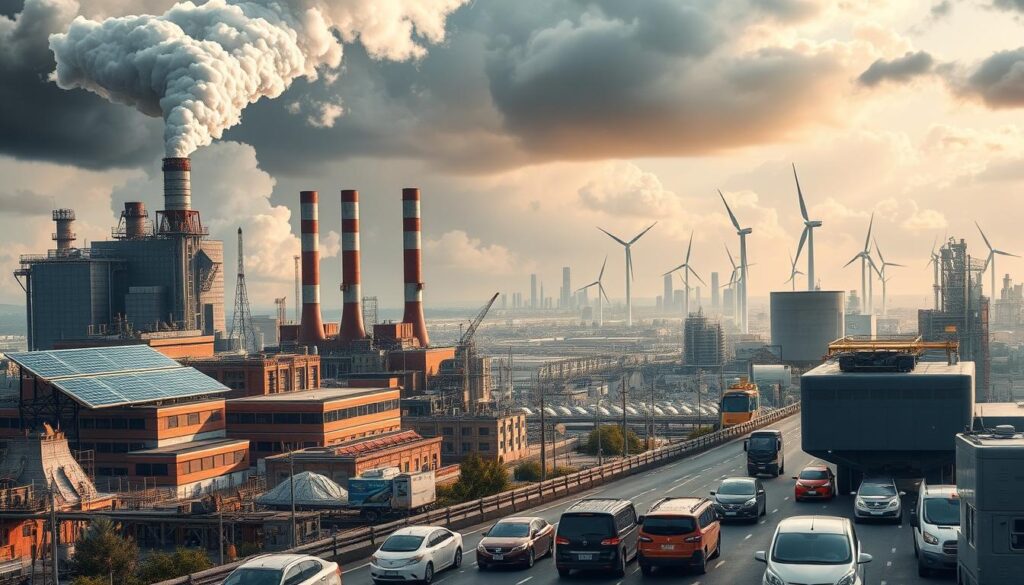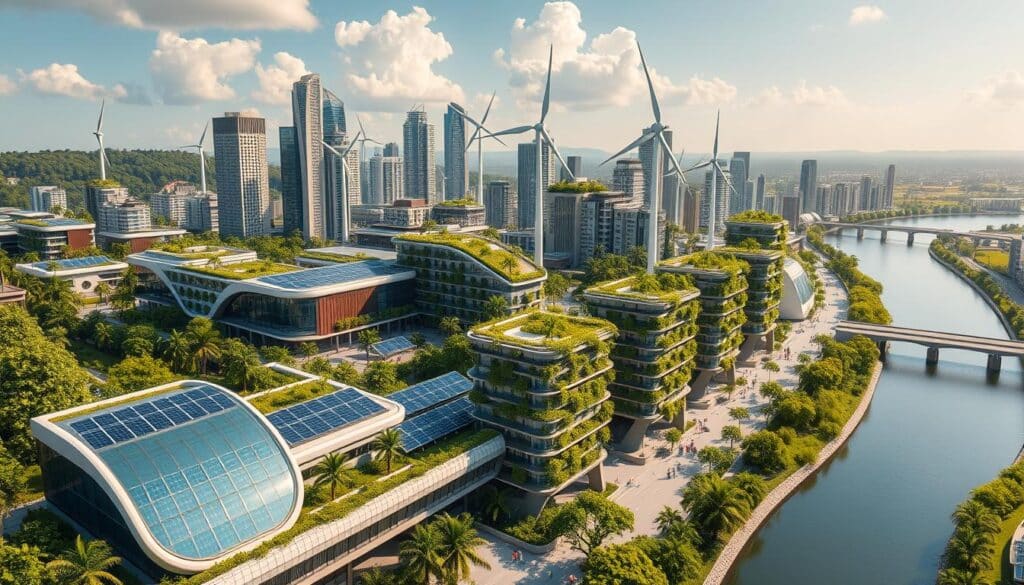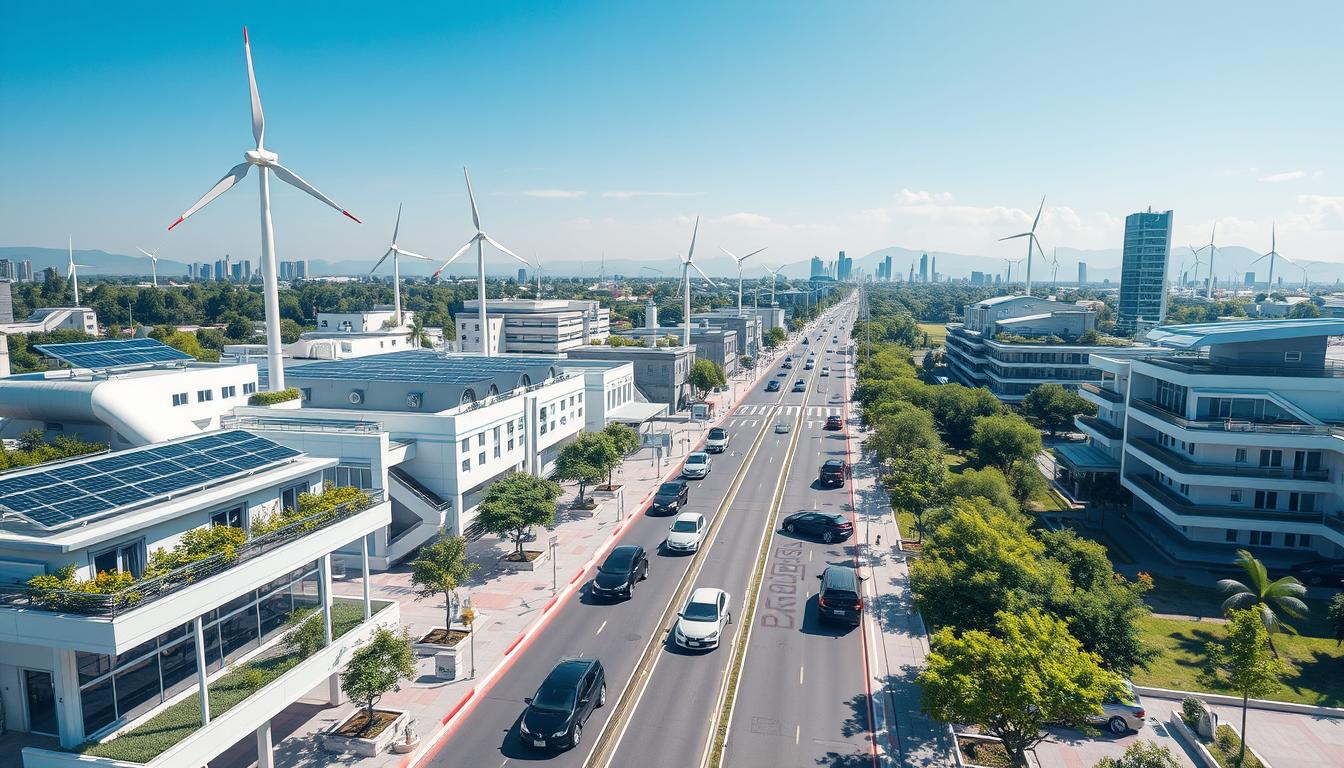Clean technology, or cleantech, includes many practices and innovations to reduce environmental harm and support sustainability. By 2019, big banks like BBVA saw the value of sustainability. They made it a key part of their plans. Since then, BBVA has been a big player in the Project Finance sector.
They help fund the creation and operation of renewable energy projects. This support is key for the global shift to cleaner energy.
Institutions like BBVA play a big role in the Project Finance sector. They help develop renewable energy projects using clean technology. Jaime Artola, from BBVA’s Corporate and Investment Banking, talks about the changing world of clean technology. He explains how it’s changing many industries.
Key Takeaways
- Clean technology includes many practices and innovations to reduce environmental harm and support sustainability.
- Big banks like BBVA have recognized the importance of sustainability. They are actively involved in funding renewable energy projects through Project Finance.
- Investments in clean technologies and new clean technologies are crucial for the global energy transition towards a more sustainable future.
- The clean technology industry has seen significant growth. Solar energy project costs have dropped by 15% in the last 15 years.
- Innovative solutions in electric transportation, recycling, and energy efficiency are driving the transformation of various industries towards more sustainable practices.
The Importance of Cleantech
Clean technology, or “cleantech,” is key in our fight against environmental issues. It includes products, services, and processes that help reduce harm to our planet. These efforts focus on using energy more efficiently, using resources sustainably, and cutting down on waste.
Renewable Energy
Renewable energy sources like solar, wind, and hydro power are at the heart of cleantech. They are quickly taking over from fossil fuels, which harm our climate. The market for clean energy could grow to $650 billion annually by 2030.
Energy Efficiency
Technologies like electric cars and smart grids are making our energy use more efficient. This means less pollution and big savings for companies and people. The growth of these technologies has been impressive, with rates between 19% and 105% until 2023.
Waste Reduction
Cleantech also works to reduce waste through recycling and sustainable production. This approach helps businesses lower their environmental footprint and save money. It’s estimated that about 2.4 trillion Euros are needed to grow clean technologies across different sectors.
As the world’s needs grow and fossil fuel prices rise, clean technology becomes more vital. It’s not just good for the planet; it also offers cost-effective and dependable options for businesses. This makes it a key part of our journey towards a sustainable and carbon-neutral future.
“The global market for clean energy technologies is estimated to be worth around $650 billion by 2030, indicating a three-fold increase from the current volume of business.”
Investment Trends in Clean Technology

The world is moving towards a sustainable, low-carbon economy fast. In 2023, investment in clean technology hit a record $1.8 trillion, up 17% from the year before. This shows how important it is to tackle environmental issues, now seen as a smart investment.
Venture Capital and Private Equity
Venture capital and private equity firms are leading in cleantech investment. They’re attracted to startups with new, green technologies. These include renewable energy, energy storage, and electric vehicles.
Public Markets
Public markets are also booming with cleantech IPOs and SPACs. Investors see the potential in companies driving the clean tech revolution.
Institutional Investors
Institutional investors like pension funds and insurance companies are putting more money into cleantech. They’re drawn by the sector’s growth and its alignment with ESG goals.
Government Support
Government support is key for cleantech investment. Subsidies, tax credits, and grants for green projects are helping. So are rules to cut carbon emissions.
| Investment Sector | 2023 Investment ($ billion) | Year-on-Year Change |
|---|---|---|
| Electrified Transport | 634 | +36% |
| Renewable Energy | 623 | +8% |
| Energy Storage | 121 | +76% |
| Hydrogen | 51 | +200% |
| Carbon Capture and Storage | 18 | +90% |
Clean technology investment is growing fast. This shows the world’s move towards a sustainable future. It’s driven by new tech, good policies, and growing awareness of the environment.
Key Trends Shaping Clean Technology Investment

The clean technology world is changing fast. New trends are changing how we invest in clean tech. These trends include decentralizing energy, electric vehicles, and carbon capture. They are changing how we think about being sustainable.
Decentralization of Energy
One big change is the move to decentralized energy. Instead of big power plants, we’re seeing more small energy sources. This includes rooftop solar and microgrids. It lets people make their own energy.
This shift is leading to more investment in energy storage and smart grids. These technologies help make using renewable energy easier.
Electrification of Transport
Another big trend is the move to electric vehicles. Governments are setting goals to stop using cars that burn fuel. This means more money for EV tech and charging stations.
Investors are putting money into companies that make EVs and the tech needed to support them. This is because EVs are becoming more popular.
Circular Economy
The circular economy is also becoming more important. It’s about recycling, reusing, and making things in a way that’s good for the planet. Companies are using tech to make things last longer and reduce waste.
More money is going into these circular economy ideas. People and businesses want to do less harm to the environment.
Carbon Capture and Storage (CCS)
CCS tech is key for a low-carbon future. It captures carbon dioxide and either stores it or uses it. This helps fight climate change and supports a sustainable economy.
Investments in CCS are growing. It’s a big part of the solution to our environmental problems.
These trends are changing clean tech investment. Investors and businesses are looking at new ways to make money. They’re focusing on decentralized, electrified, and circular energy, and CCS.
By following these trends, clean tech can help our planet grow in a sustainable way. It’s a big step towards solving our environmental challenges.
Clean Technology: Transforming Industries
The clean technology sector is growing fast and becoming a big industry worldwide. New clean technologies, green technologies, and energy technologies are key to meeting our big decarbonization goals by 2050. These technological innovations open up big chances for those who invest in clean energy projects and clean technology solutions.
The growth of clean technology is slow but steady, often needing subsidies and public funding. Yet, it’s clear that clean technology can tackle our big environmental challenges. Lately, we’ve seen a big jump in investment in renewable energy and clean technology innovation. This is thanks to new tech, good policies and regulations, and more people realizing the importance of environmental sustainability and economic resilience.
As we focus on decarbonization and greening different sectors, clean technology is becoming more important. It’s key to making our planet and economy better. By focusing on environmental stewardship and sustainable development, we’re creating lots of chances for companies and investors in the clean technology space.
| Key Highlights | Statistics |
|---|---|
| Inflation Reduction Act’s Investment in Clean Technology |
|
| Global Market for Clean Energy Technologies |
|
| Opportunities in the Clean Technology Industry |
|
The clean technology sector is changing industries, solving big environmental issues, and helping the world move towards a more sustainable and resilient economy. As we face the urgent need to tackle climate change and environmental degradation, clean technology is set to be crucial in shaping our future.
Challenges Facing Clean Technology Adoption

The clean technology sector is growing fast but faces big challenges. One major issue is the technological risk of new, untested technologies. Investors are cautious about these risks, especially for startups.
Another big problem is market uncertainty. Changes in government policies and energy prices can shake the market. This makes it hard to predict how well investments will do.
Most clean technologies need a lot of money to start and grow. This is a big hurdle for small companies. It makes it hard for them to join the clean tech race.
The competition in clean tech is getting fiercer. While it drives innovation, it also makes it tough for companies to stand out. This can hurt their profits and make it hard to keep a strong business model.
| Challenge | Description | Impact on Adoption |
|---|---|---|
| Technological Risk | Uncertainty about how well new clean technologies will work in the long run, especially for startups. | Can scare off investors and slow down new tech in the sector. |
| Market Uncertainty | Changes in government rules and energy prices can shake the clean tech market. | It’s hard to guess how well investments will do, adding to the risk. |
| Capital Intensity | Starting and growing clean technologies costs a lot of money. | It’s a big barrier for small companies, slowing down the adoption of new tech. |
| Competition | More companies are entering the clean tech field, leading to more competition. | It can make it hard for companies to make a profit and stand out. |
To get more clean technologies out there, everyone needs to work together. Governments, companies, and consumers must join forces. They can help by supporting clean tech and offering incentives for new ideas and ways of doing business.
Digital Transformation for Sustainable Development

Digital transformation is key for sustainable development. It helps institutions make a positive impact on the environment and society. It also ensures they stay profitable in the long run. Technologies like data analytics and cloud computing help businesses use energy better, reduce waste, and make smart choices for sustainable manufacturing.
Using digital technologies is good for the planet and makes businesses more efficient and cost-effective. Tools like AI and data analytics platforms give insights from big data. This helps find patterns, improve processes, and boost productivity and innovation.
Satellite tools also give important data on the environment. They help with climate models and assessments. This data is vital for making decisions that help the planet and meet global sustainability goals.
| Digital Technology | Sustainable Impact |
|---|---|
| Data Analytics | Optimize energy consumption, minimize waste, and make informed decisions for sustainable manufacturing |
| Internet of Things (IoT) | Generate real-time insights for process optimization and productivity enhancement |
| Satellite Remote Sensing | Provide data for climate models and environmental assessments to support sustainability efforts |
| AI and Machine Learning | Identify patterns and drive data-driven strategies for sustainable innovation |
Digital transformation and sustainability go hand in hand. They open up new possibilities for businesses. From reducing environmental impact to improving efficiency and profitability, this partnership is essential. It helps tackle big challenges like climate change and resource depletion, leading to a better future.
Also Read : Top Career Paths for MBA Graduates in Data Science and Analytics
Conclusion
Clean technology is key to a sustainable future, solving many global environmental problems. It has seen a big increase in investment, thanks to new tech, policy support, and a growing need for sustainability. Despite short-term hurdles, the outlook for clean tech investments is very positive.
Cleantech is becoming more important for our planet’s future and the global economy. It focuses on protecting the environment and making economies stronger. Investing in renewable energy and clean tech is vital for fighting climate change and creating a greener world. Those who invest wisely will see big financial gains.
The clean tech industry is full of promise, offering chances for innovation, jobs, and economic growth. It also helps the environment. With government support and more people wanting sustainable solutions, clean tech’s future looks bright. This paves the way for a better future for everyone.
FAQs
Q: What are clean technologies and how do they relate to pollution?
A: Clean technologies are innovations designed to reduce environmental pollution and enhance sustainability. They focus on minimizing waste, reducing greenhouse gas emissions, and improving energy efficiency, thereby addressing pollution and its environmental impact.
Q: How can sustainable energy contribute to pollution reduction?
A: Sustainable energy sources, such as wind power and solar energy, produce little to no greenhouse gas emissions during operation. By replacing fossil fuels with these clean energy alternatives, we can significantly reduce air pollution and the overall environmental effect of energy production.
Q: What role does recycling play in waste management and pollution control?
A: Recycling is a critical component of waste management that helps to reduce the volume of waste sent to landfills. It conserves natural resources, lowers energy consumption, and reduces pollutants released into the environment, thereby mitigating environmental pollution.
Q: How does the adoption of clean technologies align with the sustainable development goals?
A: The adoption of clean technologies supports several sustainable development goals, particularly those focused on sustainable cities, responsible consumption, and climate action. By integrating these technologies, we can accelerate progress towards environmental protection and improve overall environmental quality.
Q: In what ways can investment in cleantech foster sustainable development?
A: Investment in cleantech fosters sustainable development by promoting innovation in green technology, which leads to cleaner energy systems and improved waste management practices. This not only helps combat pollution but also creates jobs and stimulates economic growth in developing countries.
Q: What are the environmental benefits of wastewater treatment technologies?
A: Wastewater treatment technologies effectively remove pollutants from water before it is released back into the environment. This process protects aquatic ecosystems, improves water quality, and reduces the potential for environmental pollution, contributing to healthier communities.
Q: How can smart cities utilize clean technologies to combat environmental pollution?
A: Smart cities can leverage clean technologies, such as energy-efficient buildings and integrated renewable energy systems, to reduce pollution levels. These innovations enhance urban sustainability, promote efficient waste management, and improve overall environmental performance.
Q: What is the significance of research and development in clean technology sectors?
A: Research and development in clean technology sectors are essential for driving innovation and improving existing technologies. By focusing on advancements in battery technology, renewable energy integration, and pollution control methods, R&D can significantly enhance the effectiveness of efforts to reduce environmental pollution.
Q: How do environmental regulations influence the development of clean technologies?
A: Environmental regulations play a crucial role in promoting the development of clean technologies by establishing standards and incentives for pollution reduction. These regulations encourage businesses to adopt innovative solutions that minimize their environmental impact and comply with sustainability goals.


